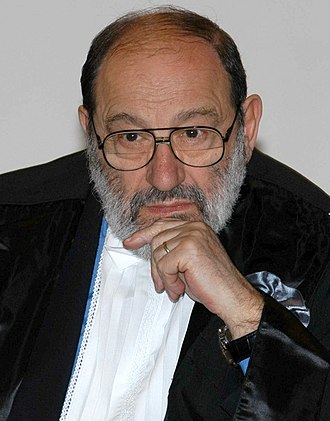Umberto Eco
Umberto Eco (January 5, 1932 – February 19, 2016) was an Italian writer and professor of medieval history in Bologna.
Umberto Eco | |
|---|---|
 Umberto Eco in 2005. | |
| Born | 5 January 1932 Alessandria, Piedmont, Italy |
| Died | 19 February 2016 (aged 84)[1] Milan, Italy |
| Era | 20th / 21st-century philosophy |
| Region | Western Philosophy |
| School | Continental philosophy |
Main interests | Semiotics |
Notable ideas | The "open work" (opera aperta), the "intention of the reader" ("intentio lectoris"), the "limits" of interpretation |
Influences
| |
| Signature | |
 | |
Eco was born in 1932 in northern Italy.
As a student, he studied philosophy, history, literature, and educational sciences. He finished his studies in 1954 with a doctoral thesis about Thomas Aquinas. In 1962, he married.
His career as an author began with The Name of the Rose in 1980, after he had already written many academic papers.
Biography
Eco was born on January 5, 1932 in Alessandria. His family had 13 sons. He studied philosophy and humanities at the University of Turin. He received a Ph.D. there.
Eco worked as a professor in different places. Starting in 1971, he held the chair of semiotics at the University of Bologna. At a university, a "chair" is the highest rank a professor can earn. He was also given honorary degrees by thirty different universities.
He had been named satrap of pataphysics for his humorous works. One of his most important books is How to Travel with a Salmon.
He was a member of UNESCO's Council of Sages. In 2000, he received the Princess of Asturias Award for Communications and Humanities.
Eco worked in the mass media as well, creating cultural programs.[2] His interests were the Middle Ages, languages, and the classics. He was also an expert on James Bond.
On February 19, 2016, Eco died at his home in Milan, Italy, of pancreatic cancer. He was 84.[2]
More famous works
Novels
- Il nome della rosa (The Name of the Rose, 1980) - A historical novel set in the Middle Ages. This novel made Eco famous after it was turned into a best-selling movie.[2]
- Il pendolo di Foucault (Foucault's Pendulum, 1988) - Three workers at a publishing house are trapped in their own fiction.
- L'isola del giorno prima (The Island of the Day Before, 1994) - A nobleman from the 17th century gets trapped on a yacht and wonders about how time is passing.
- Baudolino (2000) - An emperor mistakes a young peasant for his own child. This is a picaresque novel (a novel whose main character is a dishonest person or a criminal. This person tells their story in bits and pieces).
- La Misteriosa Fiamma della Regina Loana (The Mysterious Flame of the Queen Loana, 2004) - A man who loses his memory tries to get it back. This novel is set in the times of Eco's youth.
Other works
- Opera Aperta
- Minimal Diary
- Kant and the Ornithorhynchus
- Semiotics and philosophy of the language
- The firm
- Art and Beauty in the Medieval Aesthetic
- The Limits of Interpretation
- Six Walks for the Narrative Forests
- Lector in fabula
- Apocalyptics and Integrates
- On Literature
- Searching the Perfect Language
- History of Beauty
- On Ugliness
Umberto Eco Media
Umberto Eco photographed by Oliver Mark, Milan 2011
Collège de 'Pataphysique, stamp of Satrap Umberto Eco. By Jean-Max Albert Rt, 2001
References
- ↑ "È morto lo scrittore Umberto Eco" [The writer Umberto Eco is dead]. Corriere Della Sera Online (in Italian). 19 February 2016. Retrieved 19 February 2016.
{{cite web}}: CS1 maint: unrecognized language (link) - ↑ 2.0 2.1 2.2 "Umberto Eco, Italian author of 'The Name of the Rose,' dies at 84". Reuters. 20 February 2015. Archived from the original on 12 September 2019. Retrieved 20 January 2016.
Other websites
| Wikimedia Commons has media related to Lua error in Module:Commons_link at line 62: attempt to index field 'wikibase' (a nil value).. |
- Foundation Prince of Asturias, Prince of Asturias of Communication and Humanities 2000 Archived 2008-07-04 at the Wayback Machine (in Spanish)


